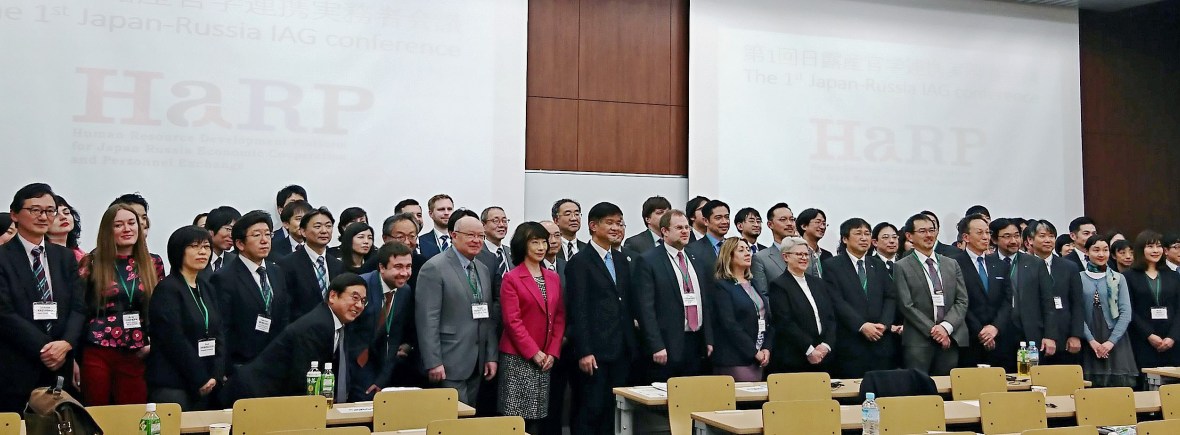February 28, 2019 (Thursday)
The First Meeting of the Japan Russia Industry, Academia, and Government Working-Level Conference (IAG Conference) was held Three members of the TUFS Office for International Affairs were in attendance, namely Professor Numano Kyoko (who has spearheaded this project), Program Coordinator Arai Shigeru, and Mr. Iwata Yoshihisa.
The conference was attended by a total of 102 people, representing 22 Japanese universities, 7 Russian universities, and 19 Japanese government agencies, administrative bodies, companies, associations, and so forth.
The conference consisted of two sessions. The first session was held in the morning; after a report of the activities of the universities selected by the Inter-University Exchange Project (Russia) in 2014 over the past five years, the session moved on to a report on the activities carried out in 2018 by schools selected in 2017 (including TUFS). All schools are expected to pass a mid-term assessment this spring.
- Schools selected in 2014: Tohoku University, Tsukuba University, Tokyo University, Niigata University, Hokkaido University
- Schools selected in 2017: TUFS, Tokyo Institute of Technology, Chiba University, Kanazawa University, Nagasaki University, Fukushima Medical University, Tokai University, and Kinki University
In the second session held during the afternoon, the main part of the IAG conference started. This included an overall orientation, discussion of the cooperation in the medical field between Niigata University and Krasnoyarsk Medical University, presentations by students who had participated in the internship program (there were two programs attended by Russian students in Japan, and two programs attended by Japanese student in Russia), discussion of the expectations of the Russian Universities which are party to the IAG agreement as elucidated by representatives of Pacific National University and Moscow State University, and finally a panel discussion with the representatives of corporate interests and local administration.
During the luncheon meeting held by the committee for human resources exchange and the board of governors (of which TUFS is a member) a discussion was had on the subject of credit exchanges, joint degrees, and double degrees between Japanese and Russian universities. Additionally, there was a discussion about a student forum which will be held at Moscow State University this fall during the second General Conference of the Association of Institutions of Higher Education of the Russian Federation and Japan.
Finally, a meeting of the student union was held, which was attended by Hyodo Daisuke, a sophomore in the School of International and Area Studies at TUFS.
History of AIG
In 2014 and 2017 the universities selected by the Inter-University Exchange Project (Russia), as a part of the implementation of each university’s plan, they develop better practices in terms of human resource development, and each university gathers together once per year for a “Selected Schools Liaison Meeting” in which they exchange information and opinions.
Additionally, in 2017 Hokkaido University and Niigata University were jointly accepted to the program (Type B: Platform Construction Program), with former championing a program centered on fostering human resources capable of implementing sustainable development in terms of culture and environment in the Far East and the Arctic Circle (RJE3 Program), while the latter championed a program based on developing a framework for the fostering of human resources in the medical field to contribute to Russo-Japanese economic and industrial development (=G-Medex Program); these led to the creation of a regional consortium involving businesses, local administrations, banks, and so forth. With this in mind, the AIG conference was held so that each university could share the practices they have put in place regarding human resource development, and so that universities, enterprises, local governments, and students could meet together to share ideas about future development of these practices in the context of Russo-Japanese exchange.

